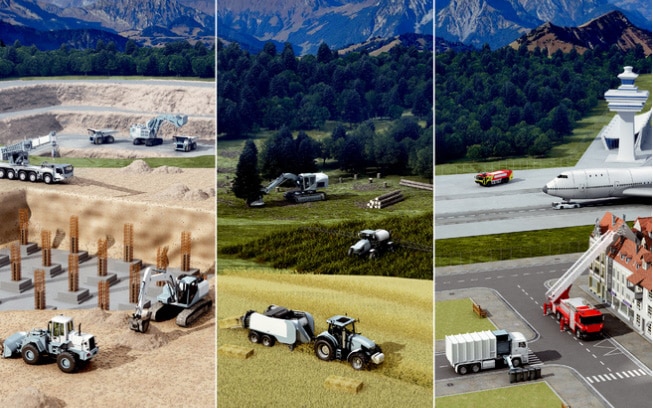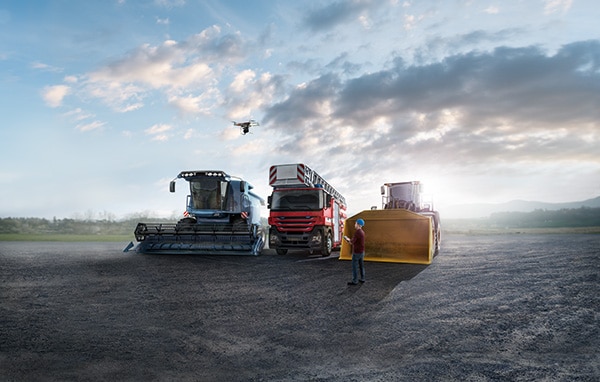The rapid pace of progress in electronics and sensor technology is determining the level of innovation in mobile machines today. The manufacturers and users of agricultural and forestry, construction and mining machines as well as special and municipal vehicles are harnessing the potential of intelligent sensors from SICK. Processes are being made more efficient, more precise, and more environmentally friendly.
Agriculture and construction enterprises are constantly faced with new challenges, for example: Population growth is increasing the demand for food, while cultivation areas are dwindling. In the construction sector, the expansion of infrastructure must be promoted, and existing spaces must be used much more efficiently. The range of technical requirements for the automation of municipal vehicles such as street cleaners or fire trucks is wide and highly varied. Due to the variety of application possibilities, a broad range of tasks has been opened up with respect to operation, control, and networking of special functionalities. In order to overcome these challenges, forward-thinking technologies and system solutions are indispensable elements for the automation of mobile machines.

From industry automation to mobile automation
On the way towards highly automated and even autonomous mobile machines we can draw on the broad technology portfolio SICK offers as well as on our experience in the automation of machines and vehicles. The range of mobile solutions for the material flow within factory buildings extends from cellular conveyor systems and pallet shuttles to freely navigating automated guided vehicles, narrow aisle trucks, indoor cranes, and special vehicles. Moreover, solutions for mobile outdoor applications, where changing weather conditions are a primary concern, and solutions for underground applications are not new challenges for SICK sensors either. They have proven effective for many years in ports, mines, and many other demanding environments.
Manufacturers and users of mobile machines are watching the current trends in the automotive industry very closely. Many of these developments are transferable to mobile machines. This includes telematics solutions, which are already found in cars under the umbrella term “connectivity.” These kinds of remote data transfer systems can be used for Smart Services such as fleet management or early detection of wear. As, in contrast to factory automation, there are no buildings or any other infrastructure in mobile automation that enable grid-bound networking of the individual process participants, cloud-based networking as well as cable-free machine-to-machine communication are particularly important in this sector.

Mobile automation requires sensor intelligence
As a sensor manufacturer, SICK is a data provider for intelligent machines. SICK already offers globally leading products for many of the tasks in this sector and also relies on solutions based on the clever linking of hardware and software. The main tasks of sensors in mobile automation include detecting and positioning, e.g., for driver assistance. With these in mind, SICK offers a comprehensive portfolio ranging from standard sensors and intelligent sensors with integrated application algorithms through to complex system, IoT, and cloud‑based solutions. In the development of 3D streaming cameras, laser scanners, ultrasonic sensors, inclination sensors, encoders, and inductive proximity sensors, as well as intelligent assistance systems and Safety Solutions, SICK applies a wide range of technologies. Sensors and systems are key technologies for many of the major technology-driven future markets. Thanks to “Sensor Intelligence.”, products can perform so many more tasks combined than they could alone. Therefore, the integration of sensors and sensor systems into mobile machines is crucial for everyday solutions that meet expectations both in terms of increased productivity and lower process costs.

